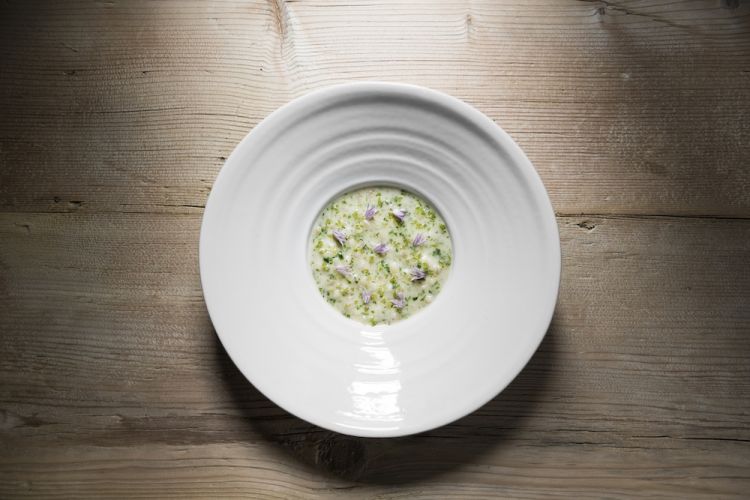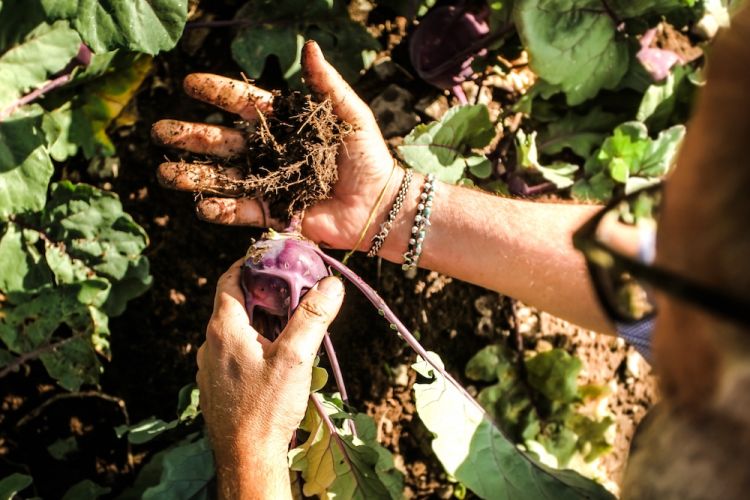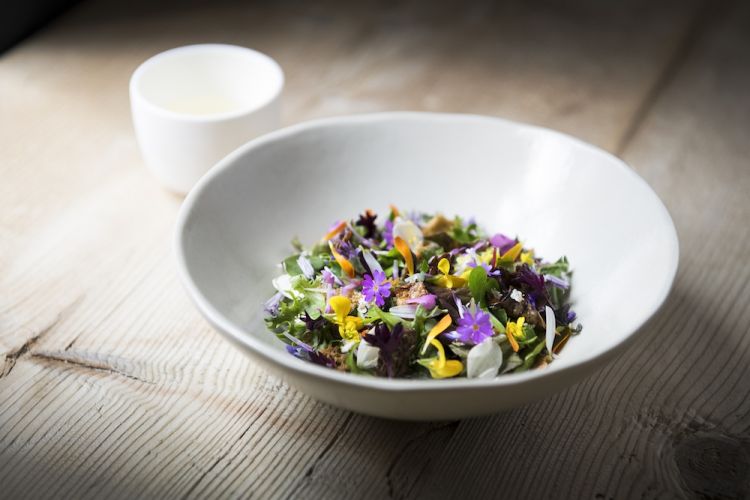«We must work together. We don’t have a leadership that can support us». These are the words of Norbert Niederkofler, patron at St. Hubertus at Hotel Rosa Alpina in San Cassiano, Alta Val Badia, 3 Michelin stars. Today, more than ever, he’s convinced that Cook the Mountain, his cooking philosophy, is the right road to follow to face the changes that await us. We joined him virtually in South Tyrol among his beloved mountains.
How are you facing the emergency?
This is for me a time for thinking, and a time of paradoxes. I realise I’m spending precious time with my family, time I didn’t have before. I see nature recovering in an incredible way, while the economy is going down the pan. And I realise that we’ve built a fragile way of living our daily lives. In the end we’ve seen how nature, if that’s what it wants, can bring the whole world to its knees in just a few weeks, without wasting a bullet.
What worries you the most?
I can’t see a real leader. Someone who can make decisions. In the end we must do by ourselves. And it’s a pity that we don’t realise that it is only through respect, and most of all by working together, that we can put this moment behind us. Starting from South Tyrol, as well as Italy, Europe, the world. I don’t see people showing they’re capable of putting their personal interest aside, but most of all I see we have no vision for the future of our children.
What actions could be crucial to support restaurants in these months?
The only possibility is to work together, and have some clear rules, so people know what they can do. ‘Is it worth it? Can I apply these rules? How should I adapt my restaurant for the future? It makes no sense to postpone payments, because in the end we will have to pay. If we don’t find other solutions, it will be hard to start again.
Ferran Adrià says the world restaurant industry will need a new paradigm. What’s your opinion?
I’m convinced that what we’re doing with Cook the Mountain is the right solution: we must give value to the territory through its products and producers, a huge richness for our regions. I think that those who share our thoughts should have some support both in terms of taxes and in terms of aid from the government. We must help territories start again at every level – like with South Tyrol. But with simple and clear rules, that can be respected without any easy way out.

Orzotto with mountain herbs (Alex Moling)
Human values, those for which our fathers and grandfathers have fought. The cultural values we must pass onto our children. I think it’s time to stop all the chitchat, and I think everyone knows this.
Your colleagues thought of delivery and of selling bonds for future dinners for a special price. How about you?
They’re all great ideas, but even in this case we should know what the future will be like. Any new project requires investments and is risky if the situation and the regulations are going to change. Food is part of our cultural heritage, and should be “treated” as such. Exactly what happens in Nordic countries.
You’ve postponed Care’s, what will happen?
It was a difficult decision to make. We worked for 4 years to have guests such as Yvon Chouinard, founder of Patagonia and a pioneer of environmental sustainability in the industry with, for instance, specific programmes for employees or on the use of recycled plastic. We must wait to see when we can organise the next edition. There’s plenty of ideas and we have faith and enthusiasm. We’re sure we can continue the work we have begun.
How expensive is it to keep a restaurant as prestigious as yours open in such a difficult time?
It’s difficult for everyone. For Hotel Rosa Alpina and for all our employees. We’re forced to wait while costs rocket. We have mortgages to pay, and guys at home. I don’t know how long we can go on like this. The hospitality industry will probably be the last to start again. Clients from abroad will have to go on a quarantine. We don’t know how many guys will still have a job. It’s a very delicate and difficult situation.

Photo by Daniel Töchterle
The thing is we don’t know what they are and most of all when they will come. In any case, the money lent will have to be repaid. The government’s measures won’t be a solution. If according to industry studies your business is worth 3K euros per month, I don’t understand why they give 600 euros per month of support. I’m grateful for this contribution, but in fact it’s still a paradox.
How about the summer season? Will you open?
It will depend on when the borders will open in the rest of Europe, and when flights will start again. For now, there’s the possibility of working with Italians, but even in this case we must see what the rules will be. In my opinion many won’t open again, but I hope that they will at least open again for the winter season.
What do you think of the future?
Big changes lie ahead. Travelling will become more expensive, this also because many airplane companies will probably disappear. People will prefer safe destinations like cultural trips with the families, and will travel less around the year. There will be less business travel, because we’ve seen that with videoconferences it can often be avoided. All this can become a good thing in the future too: everything will be less frenetic, people will stay in Italy more, and will stay in South Tyrol too – another reason why it’s good that all Italians rediscover the region. We have landscapes of incredible beauty, with the Dolomites and the Alps as the background for an authentic, untouched nature. And you can practice sports all year long: snow sports in the winter, hiking or cycling in the summer, sports full of adrenaline for the brave, recreational activities for families, beauty centres where you can relax, not to mention the cultural offer which is increasing more and more with themed museums that are truly unique. And then there’s the hospitality offer, with family run businesses with a particularly welcoming atmosphere, and luxury hotels offering every comfort, but always with attention to sustainability. Finally, not less important, there’s the food, the authentic local and genuine one, made of a farsighted tradition. This will serve most of all to offer a future to the next generations, since they will have to bear this weight. This is why we need vision and development strategies to offer everyone the chance to fulfil their dreams.

Mountain salad (photo Alex Moling)
Nature doesn’t stop. And since you’re used to using fresh local products and promoting waste reduction, how do you think one can support the supply chain and small producers?
We’re designing the work with our farmers: what to plant, sow and breed, to support the supply chain during the emergency. And we’ll have to find a way to use the products without wasting anything. This is why we’re always in close contact with them. It’s a reciprocal advantage.
Will such a difficult experience help humanity to change approach to nature, the environment and life?
I hope so. Nature has shown us what it’s capable of in a very short span. We’ve already been working for a year on a book that will be out in October, titled “Cook the Mountain – The nature around you”. It will be entirely made in South Tyrol and in Italy, printed on apple paper (100% recycled paper from apple wastes), while the cover is made with apple leather (also recycled from apples). In around 400 pages we will present Cook the Mountain, the relationship with the producers, the artisans of this region and the breeders. Real everyday stories of beauty and effort. But to go back to the question, I don’t think we will forget this difficult period so rich of paradoxes. We are constantly connected to the world, but we’re still isolated in our homes. For children this is a difficult time, a situation that is hard to understand: staying at home, giving up on habits and behaviours we have taught them and which for our culture have always been important, like a good handshake, an affectionate kiss, spending time together.
Translated by Slawka G. Scarso